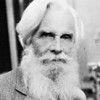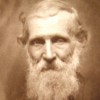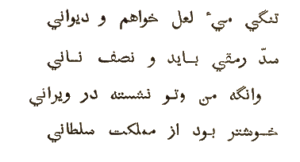Make me true lover of fair field and farm,
Of streams in dewy vales, of rivers broad
And lonely forests, far from pomp and fame.[Rura mihi et rigui placeant in vallibus amnes,
Flumina amem sylvasque inglorius.]Virgil (70-19 BC) Roman poet [b. Publius Vergilius Maro; also Vergil]
Georgics [Georgica], Book 2, l. 485ff (2.485) (29 BC) [tr. Williams (1915)]
(Source)
Praying to his Muse to find joy in a bucolic setting, if fear turns him back from more exotic realms of nature.
(Source (Latin)). Alternate translations:
Then I'le delight in vales, nere pleasant floods,
And unrenown'd, haunt rivers, hils, and woods.
[tr. Ogilby (1649)]
My next Desire is, void of Care and Strife,
To lead a soft, secure, inglorious Life.
A Country Cottage near a Crystal Flood,
A winding Vally, and a lofty Wood.
[tr. Dryden (1709), l. 687ff]
May rural scenes, thro' meads rills sparkling please,
And woods, and rivers, in inglorious ease.
[tr. Nevile (1767), l. 543ff]
Oh may I yet, by fame forgotten, dwell
By gushing fount, wild wood, and shadowy dell!
[tr. Sotheby (1800)]
Let fields and streams gliding in the valleys be my delight; inglorious may I court the rivers and woods.
[tr. Davidson (1854)]
At least permit me to indulge my dream
Of meads, and valleys, and the mazy stream:
Be woods and waves my unambitious love.
[tr. Blackmore (1871), l. 578ff]
May the country and the rills that water the vales be my delight; careless of fame, may I love the streams and the woodlands!
[tr. Wilkins (1873)]
Then be fields
And stream-washed vales my solace, let me love
Rivers and woods, inglorious.
[tr. Rhoades (1881)]
Then let the fields and running streams delight
My unambitious verse, and charm my sight.
[tr. King (1882), l. 492ff]
Let fields and streams that run among the hills be my delight; though unknown to fame, may I be content with the rivers and the woods.
[tr. Bryce (1897)]
May the country and the streams that water the valleys content me, and lost to fame let me love stream and woodland.
[tr. Mackail (1899)]
Dear to me then be the fields, be the streams through the valleys that flow,
My fameless love upon rivers be set, and on forests.
[tr. Way (1912)]
Let my delight be the country, and the running streams amid the dells -- may I love the waters and the woods, though I be unknown to fame.
[tr. Fairclough (Loeb) (1916)]
Then let the country charm me, the rivers that channel its valleys,
Then may I love its forest and stream, and and let fame go hang.
[tr. Day-Lewis (1940)]
Still, let me relish the country, humbly revere Streams that glide through glades, the woods, the rivers.
[tr. Bovie (1956)]
May the countryside and cool streams in valleys please me; may I love rivers and forests -- inglorious though I may be.
[tr. Miles (1980)]
Then will I pray that I may find fulfilment
In the country and the streams that water valleys,
Love rivers and woods, unglamorous.
[tr. Wilkinson (1982)]
Let the country
and the flowing streams in the valleys please me,
let me love the rivers and the woods, unknown.
[tr. Kline (2001)]
May rural land and streams rushing in its valleys please me.
May I, unrecognized, love its woods and waters!
[tr. Lembke (2004)]
Then let me be satisfied with rural beauty, streams bustling through the glens; let me love woods and running water -- though I'll have failed.
[tr. Fallon (2006)]
Let the land be my delight, the streams that irrigate the vales,
the rills and forests let me love unsung.
[tr. Johnson (2009)]
Then may I find delight in the rural fields
And the little brooks that make their way through valleys,
And in obscurity love the woods and rivers.
[tr. Ferry (2015)]
Quotations about:
wilderness
Note not all quotations have been tagged, so Search may find additional quotes on this topic.
Bad roads act as filters. They separate those who are sufficiently appreciative of what lies beyond the blacktop to be willing to undergo mild inconvenience from that much larger number of travelers which is not willing. The rougher the road, the finer the filter.
Joseph Wood Krutch (1893-1970) American educator, writer, critic, naturalist
Baja California and the Geography of Hope, Introduction (1967)
(Source)
This was a thought that Krutch adapted and repeated in a number of writings.
In The Forgotten Peninsula, A Naturalist in Baja California, Prologue (1961), Krutch quotes an acquaintance as saying, regarding the peninsula's unspoiled beauty, "Baja is a splendid example of how much bad roads can do for a country." This quotation was often misattributed directly to him, and he adopted the sentiment.
Late in his life (Winter 1967-68), Krutch was interviewed by Edward Abbey for Sage magazine (reprinted in One Life at a Time, Please (1988)), and discussed the proposed development of the new Canyonlands National Park:
Too many people use their automobiles not as a means to get to the parks but rather use the parks as a place to take their automobiles. What our national parks need are not more good roads but more bad roads. [...] There’s nothing like a good bad dirt road to screen out the faintly interested and to invite in the genuinely interested.
The Promised Land always lies on the other side of a wilderness.
Havelock Ellis (1859-1939) British sexologist, physician, social reformer [Henry Havelock Ellis]
The Dance of Life, ch. 5 “The Art of Religion,” sec. 4 (1923)
(Source)
Everybody needs beauty as well as bread, places to play in and pray in, where Nature may heal and cheer and give strength to body and soul alike. This natural beauty-hunger is made manifest in the little window-sill gardens of the poor, though perhaps only a geranium slip in a broken cup, as well as in the carefully tended rose and lily gardens of the rich, the thousands of spacious city parks and botanical gardens, and in our magnificent National parks.
John Muir (1838-1914) Scottish-American naturalist
The Yosemite, ch. 15 “Hetch Hetchy Valley” (1912)
(Source)
This cold wilderness was utterly unfamiliar, but it did not feel hostile, just indifferent to her fate. If she fell off this path and was broken into a hundred pieces nothing up here would be one whit interested.
Kerry Greenwood (b. 1954) Australian author and lawyer
The Green Mill Murder, ch. 13 (1993)
(Source)
In the woods too, a man casts off his years, as the snake his slough, and at what period soever of life, is always a child. In the woods, is perpetual youth. Within these plantations of God, a decorum and sanctity reign, a perennial festival is dressed, and the guest sees not how he should tire of them in a thousand years. In the woods, we return to reason and faith. There I feel that nothing can befall me in life, — no disgrace, no calamity, (leaving me my eyes,) which nature cannot repair. Standing on the bare ground, — my head bathed by the blithe air, and uplifted into infinite space, — all mean egotism vanishes. I become a transparent eye-ball; I am nothing; I see all; the currents of the Universal Being circulate through me; I am part or particle of God.
Ralph Waldo Emerson (1803-1882) American essayist, lecturer, poet
“Nature,” ch. 1, Nature: Addresses and Lectures (1849)
(Source)
A Book of Verses underneath the Bough,
A Jug of Wine, a Loaf of Bread — and Thou
Beside me singing in the Wilderness —
Oh, Wilderness were Paradise enow.
Omar Khayyám (1048-1123) Persian poet, mathematician, philosopher, astronomer [عمر خیام]
Rubáiyát [رباعیات], Bod. # 149 [tr. FitzGerald, 3rd ed. (1872), # 12]
(Source)
Fitzgerald used the same translation for his 4th and 5th ed.
There are at least two close variants of this quatrain (Bodleian 149 and 153). Both introduce the wine, maybe the bread or meat, some verse, and a love interest. In the first variant, in some cases, the setting is in the wilderness which is turned to a virtual Paradise by the accoutrements; in the second case, the other factors turn the writer's mind away from Paradise itself. In the second variant, these items all brought together are valued more highly than the wealth of the Sultan. Some translators blend these together, others break them out in two (or three!) quatrains. While concordances (especially in the 19th Century) draw connections, they sometimes contradict. I have included them all here, for the reader to discern their own differences.
Alternate translations:
Some ruby wine and a diwan of poems,
A crust of bread to keep the breath in one's body,
And thou and I alone in a desert, --
Were a lot beyond a Sultan's throne.
[tr. Cowell (1858), # 13]
Here with a Loaf of Bread beneath the Bough,
A Flask of Wine, a Book of Verse -- and Thou
Beside me singing in the Wilderness --
And Wilderness is Paradise enow.
[tr. FitzGerald, 1st ed. (1859), # 11]
Here with a little Bread beneath the Bough,
A Flask of Wine, a Book of Verse -- and Thou
Beside me singing in the Wilderness --
Oh, Wilderness were Paradise enow!
[tr. FitzGerald, 2nd Ed (1868), # 12]
In Spring time I love to sit in the meadow with a paramour perfect as a Houri and goodly jar of wine, and though I may be blamed for this, yet hold me lower than a dog if ever I dream of Paradise.
[tr. McCarthy (1888), # 177]
When the hand possesses a loaf of wheaten bread, two measures of wine, and a piece of flesh, when seated with tulip-cheeks in some lonely spot, behold such joy as is not given to all sultans.
[tr. McCarthy (1888), # 398]
Give me a flagon of red wine, a book of verses, a loaf of bread and a little idleness. If with such store I might sit by thy dear side in some lonely place, I should deem myself happier than a king in his kingdom.
[tr. McCarthy (1888), #449]
In the sweet spring a grassy bank I sought
And thither wine and a fair Houri brought;
And, though the people called me graceless dog,
Gave not to Paradise another thought!
[tr. Whinfield (1883), # 84]
Give me a skin of wine, a crust of bread,
A pittance bare, a book of verse to read;
With thee, love, to share my lowly roof,
I would not take the Sultan's realm instead!
[tr. Whinfield (1883), # 452]
A Flask of Wine, a book, a Loaf of Bread, --
To every Care and Worldly Sorrow dead,
I covet not, when thou, oh Love, art near,
The Jeweled Crown upon the Sultan's Head.
[tr. Garner, 1.8 (1888)]
Yes, Loved One, when the Laughing Spring is blowing,
With Thee beside me and the Cup o’erflowing,
I pass the day upon this Waving Meadow,
And dream the while, no thought on Heaven bestowing.
[tr. Garner, 1.20 (1888)]
A flask of red wine, and a volume of song, together --
Half a loaf, -- just enough the ravage of Want to tether:
Such is my wish -- then, thou in the waste with me --
Oh! sweeter were this than a monarch's crown and feather!
[tr. M. K. (1888)]
In the Springtime, biding with one who is houri-fair,
And a flask of wine, if 't is to be had -- somewhere
On the tillage's grassy skirt -- Alack ! though most
May think it a sin, I feel that my heaven is there!
[tr. M. K. (1888)]
A book, a woman, and a flask of wine:
The three make heaven for me; it may be thine
Is some sour place of singing cold and bare --
But then, I never said thy heaven was mine.
[tr. Le Gallienne (1897)]
A book, a flask of wine, a crust of bread,
To every care and worldly sorrow dead,
I covet not when thou, oh, Love, art near,
The jeweled turban on the sultan's head.
[tr. Garner (1898), # 8]
A gugglet of wine and a book of poesy,
The haf of a loaf of bread and a penny fee,
And I in a nook of some ruin seated with thee,
Were better than king on a kingdom's throne to be.
[tr. Payne (1898), # 829]
I desire a little ruby wine and a book of verses,
Just enough to keep me alive, and half a loaf is needful;
And then, that I and thou should sit in a desolate place
Is better than the kingdom of a sultan.
[tr. Heron-Allen (1898), # 149]
If a loaf of wheaten-bread be forthcoming,
a gourd of wine, and a thigh-bone of mutton, and then,
if thou and I be sitting in the wilderness, --
that would be a joy to which no sultan can set bounds.
[tr. Heron-Allen (1898), # 155]
A book of verses underneath the vine,
A loaf of bread, a jug of ruby wine,
And thou beside me, resting in the wild,
Would make the dreary wilderness divine!
[tr. Roe (1906), # 25]
A skin of red wine, book of poesy.
Bread, a half loaf, enough for life give me.
Then sitting in some solitude with thee
Were sweeter than the Sultan's empery!
[tr. Thompson (1906), # 560]
If bread you have made from the grain of wheat,
Two maunds of wine, a mutton joint for meat,
In some nook sitting with fair Tulip-cheeks,
Not every Sultan hath such joy complete!
[tr. Thompson (1906), # 586]
Give me a scroll of verse, a little wine,
With half a loaf to fill thy needs and mine,
And with the desert sand our resting place,
For ne'er a Sultan's kingdom would we pine.
[tr. Talbot (1908), # 149]
Let Fortune but provide me bread of wheat,
A gourd of wine, a bone of mutton sweet,
Then in the desert if we twain might sit,
Joys such as ours no Sultan could defeat.
[tr. Talbot (1908), # 155]
If we get but a loaf of wheaten-bread, a gourd of wine
and a leg of mutton.
and if I and thou be sitting in the wilderness, that
were a treat beyond the powers of most sultans.
[tr. Christensen (1927), # 28]
If you have a loaf made from the marrow of wheat,
Of wine two gallons and of lamb a joint,
And if you are sitting in the wilderness with one whose face is beautiful like the moon.
That would be bliss not attainable by a Sultan.
[tr. Rosen (1928), # 320]
If one could find a loaf of grinded wheat,
And with a gourd of wine and chop of meat
Retires to ruined haunts with Beloved One,
What king can hope to find such joyous treat?
[tr. Tirtha (1941), # 7.131]
The Word suffices and a book of songs,
A crumb will fill this what to earth belongs;
In solitude when I would pore on Tee,
I care no kingdoms, neither thrones nor throngs.
[tr. Tirtha (1941), # 8.131]
Should our day's portion be one mancel loaf,
A haunch of mutton and a gourd of wine
Set for us two alone on the wide plain,
No Sultan's bounty could evoke such joy.
A gourd of red wine and a sheaf of poems --
A bare subsistence, half a loaf, not more --
Supplied us two alone in the free desert:
What Sultan could we envy on his throne?
[tr. Graves & Ali-Shah (1967), # 11-12]
If one may have a loaf of the flower of wheat, a two-maund (jar) of wine, a thigh of mutton, seated with a heart's darling in a ruined place -- that is a pleasure that is not the attainment of any sultan.
[tr. Bowen (1976), # 12a]
If we were seated in a desert place,
Where I alone might gaze upon your face,
These simple victuals would our needs suffice:
A thigh of mutton in a dish of rice;
A loaf of bread of finest wheaten flour;
A flagon tall from which cool wine to pour ...
There, in the day's long leisurely decline,
No Sultan's pleasures could compare with mine.
[tr. Bowen (1976), # 12b]
I need a jug of wine and a book of poetry,
Half a loaf for a bite to eat,
Then you and I, seated in a deserted spot,
Will have more wealth than a Sultan's realm.
[tr. Avery/Heath-Stubbs (1979), # 98]
If chance supplied a loaf of white bread,
Two casks of wine and a leg of mutton,
In the corner of a garden with a tulip-cheeked girl,
There'd be enjoyment no Sultan could outdo.
[tr. Avery/Heath-Stubbs (1979), # 234]
In spring if a houri-like sweetheart
Gives me a cup of wine on the edge of a green cornfield,
Though to the vulgar this would be blasphemy,
If I mentioned any other Paradise, I'd be worse than a dog.
[tr. Ememai (1988), # 160]
Ah, would there were a loaf of bread as fare,
A joint of lamb, a jug of vintage rare,
And you and I in wilderness encamped --
No Sultan's pleasure could with ours compare.
[tr. Saldi (1991), # 16]








